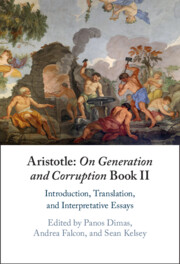 Aristotle: On Generation and Corruption Book II
Aristotle: On Generation and Corruption Book II from Part I - Introduction and Interpretative Essays
Published online by Cambridge University Press: 10 November 2022
In GC II 2, Aristotle discovers the contrarieties that constitute the principles of all perceptible bodies. They are the hot and the cold, the dry and the moist because they are the basic tangible contrarieties that interact as active and passive powers in a way that can result in a new affection. In GC II 2, Aristotle also attempts a reduction of all other tangible contrarieties to the basic four. I argue that the active/passive relation does not hold only between the two basic pairs of contrarieties but also within each pair. I compare the reduction of other contraries to the basic four with what Aristotle says in Meteor. IV. Despite minor differences and the wider scope of analysis in the latter work, Aristotle’s admirable effort to reduce the rich variety of tangible properties to a limited number of contraries and elements is the same.
To save this book to your Kindle, first ensure [email protected] is added to your Approved Personal Document E-mail List under your Personal Document Settings on the Manage Your Content and Devices page of your Amazon account. Then enter the ‘name’ part of your Kindle email address below. Find out more about saving to your Kindle.
Note you can select to save to either the @free.kindle.com or @kindle.com variations. ‘@free.kindle.com’ emails are free but can only be saved to your device when it is connected to wi-fi. ‘@kindle.com’ emails can be delivered even when you are not connected to wi-fi, but note that service fees apply.
Find out more about the Kindle Personal Document Service.
To save content items to your account, please confirm that you agree to abide by our usage policies. If this is the first time you use this feature, you will be asked to authorise Cambridge Core to connect with your account. Find out more about saving content to Dropbox.
To save content items to your account, please confirm that you agree to abide by our usage policies. If this is the first time you use this feature, you will be asked to authorise Cambridge Core to connect with your account. Find out more about saving content to Google Drive.